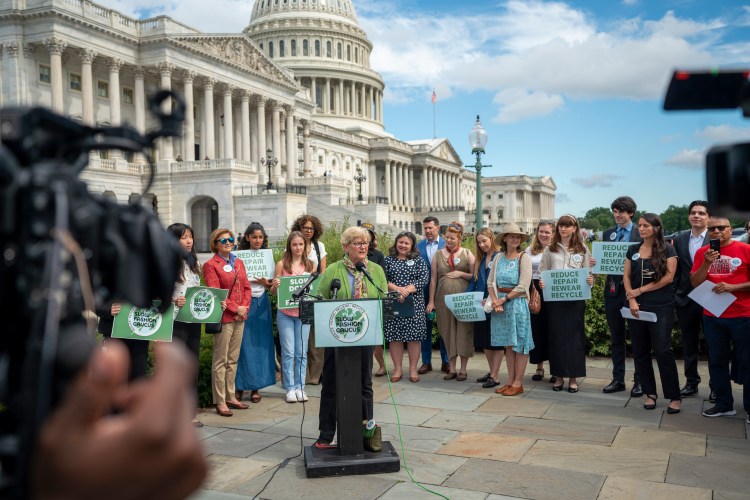
U.S. Rep. Chellie Pingree speaks outside the U.S. Capitol in Washington, D.C., Thursday about the new Slow Fashion Caucus, a group of lawmakers who want to draw attention to the effects of mass-produced, cheap clothing. Photo by Gabrielle Mannino
U.S. Rep. Chellie Pingree, wearing a pastel green thrift store sweater and floral scarf, stood outside the U.S. Capitol on Thursday to introduce the Slow Fashion Caucus, a congressional effort to draw attention to how mass-produced garments contribute to climate change.
“Often, people don’t understand the role that fashion is playing today in our climate crisis. We’ve developed these dual habits in our country – keeping up with every single fashion trend and purchasing cheap, poorly made clothing,” the Maine Democrat said in a speech, flanked by other members of Congress and supporters. “And they have become drivers of yet one more issue in our climate change crisis. In fact, the fashion industry is responsible for more carbon emissions than all international flights and maritime shipping combined.”
Slow fashion is a term describing the embrace of clothing that is made locally, out of sustainable fibers, and lasts longer. It is a response to “fast fashion,” which describes the production of clothing designed only to endure as long as a given trend does.
Pingree, D-1st District, said she hopes Congress will prioritize policies that will make clothing production and consumption more sustainable, such as investing in textile production jobs in the U.S. and holding companies accountable for the environmental impact of their products after they are sold.
“We also have to support textile reuse and recycling infrastructure to better collect and manage discarded textiles,” she said. “This could include policies that are now being enacted in European countries, like extended producer responsibility, to ensure that brands are responsible for the entire life cycle of their product.”
In an interview with the Press Herald after her speech Thursday, Pingree said one way Congress might limit the sales of unsustainable clothing is by passing the Import Security and Fairness Act (H.R. 4148), which would close a trade loophole (called the de minimus loophole) that allows foreign companies to ship products under $800 to the U.S. without tariffs.
“Someone not that long ago … passed a law in Congress that said if you’re shipping directly to a consumer and it’s under $800, you don’t have any trade restrictions, you don’t pay any tariffs,” she said. “And now there are these Chinese companies – one is Shein, one is Temu, and probably others – who now ship … an enormous amount of clothing to our county. It’s not made with the same labor standards we have, or environmental standards. Much of it is fabrics made from fossil fuels, so they don’t lend themselves to being reused.”
Pingree said Maine is particularly well-suited to embrace slow fashion.
“Maine is one of those states where I think we set a good example, because we’re very thrifty,” she said. “We like to buy our clothing and reuse them. We like rugged clothing that will last us a long time.”
In Portland, clothing store Toad&Co. has tried to encourage slow fashion by producing clothing made from at least 80% sustainable fibers and by repairing and reselling old clothing, according to operations manager Sam Cuccaro.
“We’ll buy back Toad&Co. clothing from customers if it meets condition criteria,” Cuccaro said Thursday. “People from all over the country can send in their Toad&Co., we inspect it, they get credit to spend in the form of a gift card, and then we’ll resell their Toad&Co. stuff, both in-store and online.”
Cuccaro noted that producing long-lasting clothing in the first place is what puts Toad&Co. in the position to recycle its products.
“We wouldn’t have a resale program if we didn’t have really high-quality clothing,” she said. “So the way we keep these things circulating is by starting with really good fibers. We’ve used organic cotton since 1996, before it was cool or really available. … And in the last decade or so, hemp has really improved quite a bit as a fiber for clothing.”
Rep. Marie Gluesenkamp Perez, a Democrat from Washington, also spoke at the caucus launch about how consumers also have a responsibility to buy less clothing and extend the lifespan of the clothes they already own.
“Ignore trends; buy your own stuff – follow your own sense of style” Perez said. “Learn to dye and alter and maintain your clothes. Go to garage sales and hold them yourself … Learn how to see and respect quality craftsmanship, and, if you can, buy American.”
Cuccaro said that Toad&Co. doesn’t follow trends because the company’s clothing takes a long time to go on the market after it is designed, as it takes a long time to produce.
“Our designers would tell you that they can’t keep up with trends, because the way we work with our factories is so slow,” she said. “It’s a really long process because it’s (made with) good fibers and proper production, and it takes a long time to do it that way. So we can’t really be reactive and be like, ‘oh, this is trending now.’ By the time we would rush to make that, the trend could be over.”
Related Stories









